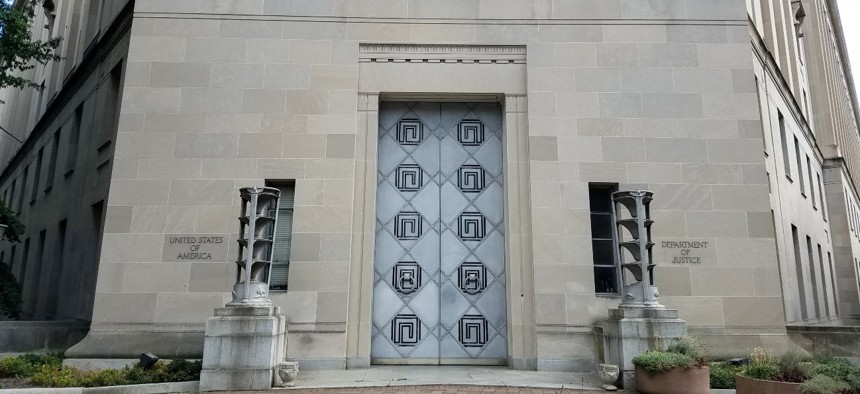
The Justice Department announced the updated guidance recently as one of many actions at the one-year mark of an executive order on increasing accountability in policing. 3000ad / iStock / Getty Images Plus
DOJ Has a Newly Updated Policy on Preventing Bias in Federal Law Enforcement
Advocacy groups said the update to a 2014 version is a good start, but doesn’t go far enough.
The Justice Department has issued updated guidance on how federal law enforcement officers should avoid bias on the basis of a person’s race, ethnicity, gender, national origin, religion, sexual orientation, gender identity or disability.
This was one of many actions the Justice Department announced recently at the one-year mark of President Biden’s executive order on increasing accountability in policing. This guidance was originally released in 2003 in the wake of the Sept. 11, 2001 terrorist attacks and focused on racial and ethnic profiling, and last updated in 2014 to expand the protected characteristics, among other things.
It has now been revised to “set forth a single clear standard for when federal law enforcement may consider a protected characteristic; add disability as a protected characteristic; expand application of the guidance beyond federal law enforcement officers to include analysts, attorneys, paralegals, contractors and other federal law enforcement personnel engaged in or supporting federal law enforcement activities; and set benchmarks and timelines for the development and implementation of training, data collection and accountability provisions,” a fact sheet from the Justice Department stated.
The standard for considering a protected characteristic is that “there is trustworthy context- and content-specific information” and law enforcement officers reasonably believe that law enforcement activity “is merited under the totality of the circumstances,” the guidance said.
The guidance applies to Justice Department personnel and non-departmental personnel when they are engaging in or supporting department-led efforts. It also applies to state, local, territorial and Tribal law enforcement officers when they participate in federal law enforcement operations.
Other federal law enforcement personnel were encouraged to adopt the guidance, as well.
Meanwhile the guidance does not apply to U.S. military, diplomatic, or non-Justice Department intelligence agencies and their activities. Additionally, it doesn’t apply to “interdiction activities at the border or its functional equivalent (e.g., airports, seaports, and other ports of entry)…and related traveler and cargo vetting activities or to protective and inspection activities,” the document stated, noting that the Homeland Security Department will be issuing a policy consistent with the guidance.
The document outlines a training schedule for the new provisions that will eventually be completed on a regular basis. Additionally, within six months Justice Department law enforcement agencies have to establish criteria on the collection of data needed to measure the effectiveness of the guidance’s implementation and within 30 days they must designate an official to coordinate implementation of the guidance.
“As the federal government has long recognized, biased practices are unfair; negatively impact privacy, civil rights and civil liberties; engender mistrust; and perpetuate negative and harmful stereotypes,” the guidance stated. “Even-handed law enforcement is therefore central to the integrity, legitimacy, and efficacy of all federal law enforcement activities.”
The Leadership Conference on Civil and Human Rights and 80 other organizations sent a letter to President Obama in 2015 saying that the 2014 update includes some “much needed improvements” to the 2003 version, but there are still some “serious flaws.”
In regard to the new guidance, Jesselyn McCurdy, executive vice president of government affairs at The Leadership Conference on Civil and Human Rights, said in a statement they welcome the changes, “especially the addition of disability and the expansion of the guidance beyond law enforcement officials to cover those supporting law enforcement and intelligence activities.”
The conference, which is a coalition of more than 250 national organizations, “has long called for updated guidance to address glaring loopholes in applicability,” she said. “These are much needed steps toward eliminating discriminatory profiling, but we are concerned that loopholes regarding national security and intelligence operations, as well as immigration enforcement, remain.” The coalition looks “forward to continuing to work with the Department of Justice to end discriminatory profiling by law enforcement and to ensure they follow through where this guidance falls short.”
The American Civil Liberties Union, which signed onto the Leadership Conference on Civil and Human Rights’ letter in 2015, also said that there were some good revisions, but more needs to be done.
“The new policy does not fully ban bias across all national security activities and programs — such as watchlisting, law enforcement pressuring people to become informants, or immigration enforcement — contexts in which the ACLU has repeatedly seen the most harm occur,” said their statement. “The ACLU has also called for the Department of Homeland Security to issue a comprehensive and meaningful anti-discrimination policy.”







